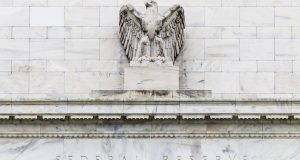""Federal Reserve"":http://www.federalreserve.gov/default.htm ""Chairman Ben Bernanke"":http://www.federalreserve.gov/aboutthefed/bios/board/bernanke.htm again made waves Wednesday with an announcement that the central bank plans to sell $400 billion in short-term Treasuries to keep a heel on still-low interest rates and offset widespread fears that the U.S. economy may soon enter a downturn. The move follows successive efforts from the Fed, which more recently pledged to keep interest rates low until 2013.
[IMAGE]Following grim outlooks from respected sources ├â┬ó├óÔÇÜ┬¼├óÔé¼┼ô ""one"":https://themreport.com/articles/fannie-us-recovery-flirting-with-new-downturn-2011-09-19 from ""Fannie Mae"":http://www.fanniemae.com/kb/index?page=home, the ""other"":https://themreport.com/articles/imf-slashes-gdp-forecasts-calls-for-housing-relief-2011-09-20 from the ""International Monetary Fund"":http://www.imf.org/external/index.htm (IMF) ├â┬ó├óÔÇÜ┬¼├óÔé¼┼ô the Fed announced that it would move forward with ""Operation Twist,"" the namesake for another short-term Treasury buy-up the central bank enacted some 50 years ago.
""To support a stronger economic recovery and to help ensure that inflation, over time, is at levels consistent with the dual mandate, the Committee decided today to extend the average maturity of its holdings of securities,"" the Fed said.
The central bank pledged to buy up $400 billion in Treasury securities by June 2012 and sell an amount equal to the Treasuries, with the hope that these moves would scale down longer-term interest rates.
""To help support conditions in mortgage markets, the Committee will now reinvest principal payments from its holdings of agency debt and agency mortgage-backed securities in agency mortgage-backed securities,"" the Fed added.
Speaking with _MReport_, economists largely panned the effort, relating the importance played by consumer confidence and demand, which remain chronically low despite rock-bottom mortgage rates.
""The key question is whether it will actually make a difference,"" ""Paul Dales"":http://www.capitaleconomics.com/staff/global-economics/paul-dales.html, a senior U.S. economist with ""Capital Economics"":http://www.capitaleconomics.com/, tells _MReport_. ""The cost of borrowing isn't the issue. It is really the ability and willingness of households to borrow and get a mortgage. Operation Twist won't solve that.""
[COLUMN_BREAK]Asked whether Operation Twist or any other stimulus measures from the federal level will improve consumer confidence, Dales says simply that ""it's always nice to hear that central bankers are taking steps to improve the economy, but I wouldn't expect it to have a material impact on confidence. Consumers are far more interested in the jobs picture and in gas prices.""
Speaking with _MReport_, ""Vance Ginn"":http://www.shsu.edu/~eco_www/faculty/ginn.htm, a lecturer in economics at ""Sam Houston State University"":http://www.shsu.edu/ and founder of ""Marginally Beneficial"":http://marginallybeneficial.blogspot.com/, compares the new stimulus measure to the federal homebuyer tax credit, which temporarily boosted home sales across the country over 2010.
""It's a failed thing,"" he says, referring to the Treasury buy-up. ""How much lower can [interest rates] go to incentivize people to buy new homes? Home prices are so low that people already have less incentive to go out and buy a home.""
He cites the Expectations Hypothesis, a theory bandied about by economists, as a way to explain declining consumer interest in mortgages and buying activity at large despite record-low rates.
""Even though the Fed can come in and manipulate markets, market participants are going to stay on the sidelines"" because of their expectations for interest rates to stay low, Ginn explains.
""Edward Pinto"":http://www.aei.org/scholar/100080, a resident fellow with the ""American Enterprise Institute"":http://www.aei.org/home, underscores consumer interest in jobs as opposed to record-low interest rates.
""Jobs create housing demand, not the other way around,"" he tells _MReport_. ""You can't pull the economy out of a crisis by goosing the housing market.""
He criticizes the American Jobs Act, more recently favored by the IMF, as a bill stocked with short-term measures.
His solution to stimulate demand? Pinto encourages a jobs policy that would allow oil and gas companies to drill off the coast, which would ""create a million jobs pretty quickly,"" he says.
""A lot of these jobs are for construction workers, and we have an oversupply of construction workers already,"" Pinto adds. ""We don't need a lot more houses right now, so why would you want to promote a lot more homebuilding when you should be promoting construction?""
The final analysis, according to Dales?
He says the Treasury buy-up ""might filter into mortgage rates eventually,"" but it won't ""bring the unemployment down to a normal rate.""
Responding to a question about whether Operation Twist will yield a long-term gain for housing, he says ""the answer is no.""

 theMReport.com Your trusted source for mortgage banking news
theMReport.com Your trusted source for mortgage banking news









